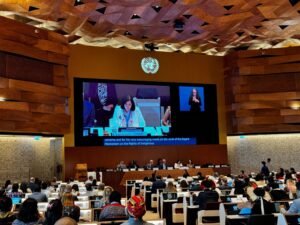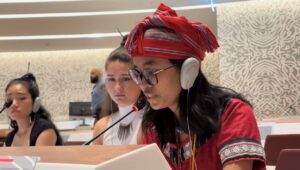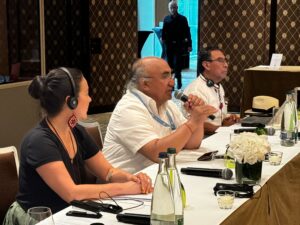The Expert Mechanism on the Rights of Indigenous Peoples (EMRIP) provides expert advice and studies to the United Nations Human Rights Council to ensure the rights of Indigenous Peoples are respected on a global scale. EMRIP was established by the Human Rights Council in 2007. EMRIP meets annually in furtherance of its role to conduct studies to advance the promotion and protection of Indigenous Peoples’ rights by clarifying the implications of key principles, such as self-determination and free, prior and informed consent; examine good practices and challenges in a broad array of areas pertaining to Indigenous Peoples’ rights; and suggest measures that States and others can adopt at the level of laws, policies and programmes.
Our Partners at EMRIP

At this year’s session, the Asia Indigenous Peoples Pact (AIPP) and the International Work Group for Indigenous Affairs (IWGIA) organized a panel discussion. The panel aimed to highlight the current status of implementing the Declaration of the Rights of Indigenous Peoples in Asia and emphasize its significance, given that Asia is home to more Indigenous Peoples than all other regions of the world combined.
Indigenous Peoples Rights International (IPRI) organized multiple side events and panel discussions during the session. These included a dialogue on the rights of Indigenous Peoples in post-conflict situations and their involvement in peace negotiations, agreements, and accords.
Read the statement presented by Rachana Sam on behalf of the Asia Indigenous Peoples Caucus.

UN Special Rapporteur on the Rights of Indigenous Peoples
The UN Special Rapporteur on the Rights of Indigenous Peoples and the (EMRIP) work together to promote and protect Indigenous Peoples’ rights globally. While the Special Rapporteur focuses on country-specific situations and thematic studies, EMRIP provides expertise and advice to the UN Human Rights Council on Indigenous issues. Both mechanisms often coordinate their efforts to address pressing concerns affecting Indigenous communities worldwide.

Francisco Calí Tzay, the current UN Special Rapporteur on the Rights of Indigenous Peoples, has called for a moratorium on all carbon trading until the markets can guarantee that all actors will respect the rights of Indigenous Peoples. This statement exemplifies the kind of advocacy work undertaken by the Special Rapporteur in collaboration with EMRIP. For more comprehensive information on the UN Special Rapporteur’s work and recent developments, please refer to the latest issue of The Indigenous World, published by the IWGIA.
The International Indian Treaty Council (IITC) held consultations on a set of principles being developed by the United Nations Environment Programme (UNEP), designed to guide private conservation actors to uphold human rights within conservation funding activities. IITC’s work to gather feedback from Indigenous Peoples worldwide is a crucial effort to ensure the rights of Indigenous Peoples are respected in the creation of global conservation standards.
At the 17th Session of EMRIP and always, we commend our partners and their allies for the tireless and important work they do every day to advance the rights of Indigenous Peoples.

